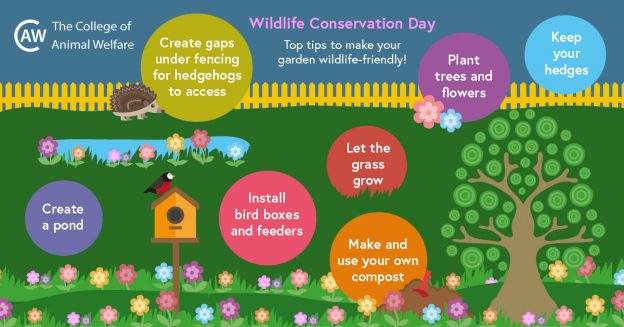According to reports, more than one in 10 of the UK’s wildlife species are threatened with extinction.
If you’re interested in being involved in wildlife conservation, why not start at home? There are many ways you can make your patch a little greener, and keep wildlife thriving in your garden…
- Grow flowers: Not only do flowers look beautiful and bring colour and life into your garden, they are also essential to bees and provide food for many insects. Choose different plants that flower the longest (providing pollen and nectar) and ditch the pesticides!
- Create a pond: Installing a small pond would be a great boost for wildlife, and it doesn’t need to be big or complicated! You can use a buried bucket or trough but remember to make sure there is a way out or at least one sloping side for animals that may fall in by accident.
- Install a birdhouse or feeder: Give birds a place to stay in your garden by installing a birdhouse or feeder. You could buy one or make your own!
- Make and use your own compost in your garden: Making and using your own compost will naturally enrich your soil, and also provide a habitat for worms and woodlice.
- Relax about weeds: There’s no need to stress about weeds! Plants such as nettles and daisies are an important source of food for many insects including butterflies and moths.
- Create a space for insects: You can leave piles of rocks and twigs in an area of your garden, to create shelter for all sorts insects such as beetles and spiders.
- Let the grass grow: Longer grass is the perfect habitat for many plant and insect species to thrive, including butterflies and wildflowers. By letting some or all of your lawn grow, you’ll be leaving more space for wildlife to grow!
- Keep your hedges: Native hedges or a mix of trees and shrubs will naturally create safe shelters or nesting sites for the larger animals and also food sources for a variety of creatures.
- Use gapped fencing: Don’t lock out hedgehogs from your garden! Where possible, use gapped fencing or create small gaps under your fences to create easy access for hedgehogs.
Wildlife Conservation Day is a global awareness initiative that aims to provide people with the opportunity to learn more about wildlife conservation and to be part of the solution to common threats to endangered species, including poaching, commercial and residential developments, climate change and pollution. To find out more visit https://www.wwf.org.uk/
Want to learn more about environmental conservation? Study our Level 2 Diploma in Countryside and Environment!
Trees of green, red roses too…isn’t nature wonderful? If you love being outdoors, are interested in the environment around you and are fascinated by wildlife and different habitats, why not learn more?
Our Level 2 Diploma in Countryside and Environment gives you the freedom to study in your own time, at your own pace. Throughout this online course you’ll gain an introduction the principles behind environmental management and conservation, learning about ecological surveys, conserving British habitats, land-based business – and much more!

